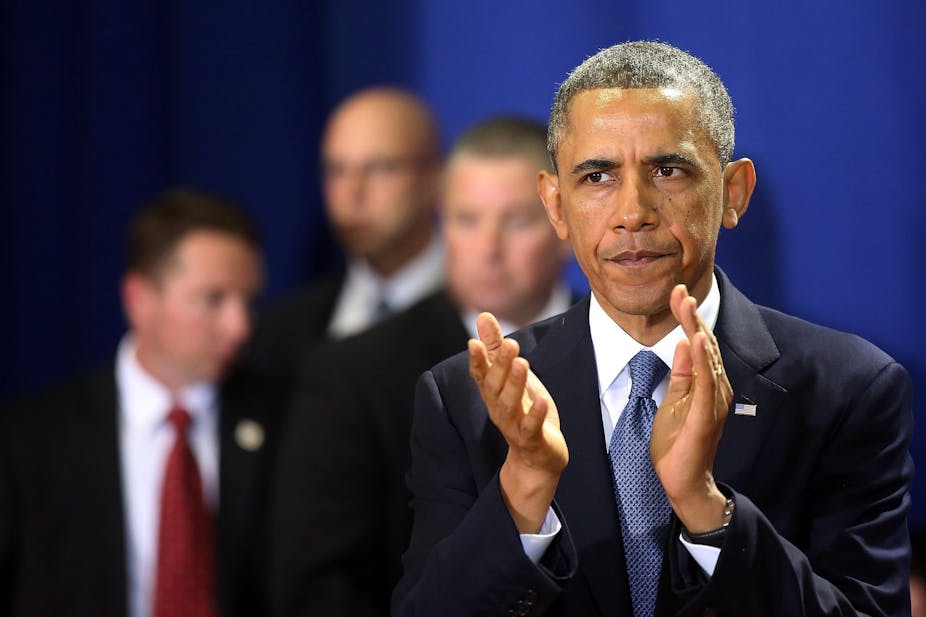For all its international power, the United States government seems increasingly powerless to make laws for the benefit of its own people. The recent failure to implement popular gun control measures in the wake of the Newtown massacre is a poignant example. 91% of Americans support President Obama’s proposal that criminal background checks should be required for all sales of guns.
Last Thursday, this measure failed to pass the United States Senate, despite having the support of a majority of Senators. How can a minority of legislators in one house of one branch of the government defeat popular legislation on behalf of an even tinier minority of Americans who are convinced that the government wants to round up gun owners and put them in camps?
Some of the answers can be found at the very beginning of the American constitution. The United States was a deeply divided society at its birth, and citizens in some states did not believe there should be a federal government at all. The framers of the constitution were very sensitive to minority rights, particularly the rights of the oldest and most paranoid minority of them all - the rich. They separated the executive from legislature, and required that legislation gain the approval of both houses of Congress as well as the President. This mutual veto power was intended to prevent either ambitious presidents or mob-like legislators from trampling the rights of minorities.
As a concession to smaller states who were nervous about domination by larger states, the constitution gave equal representation to all states in the Senate. In 1790, the largest state was about twelve times bigger than the smallest. Today, the largest state, California, is nearly seventy times bigger than the smallest, Wyoming.
Finally, there were ten early amendments to the constitution that specified a set of rights so fundamental they should never be voted on. The second of these was “the right of the people to keep and bear arms”. The meaning of this is controversial and has changed substantially over time - even the NRA used to support a much more restrictive understanding of the second amendment. But currently, the Supreme Court interprets it as protecting an individual right to own guns.
All of these design features of the United States government have significantly affected the course of recent gun control legislation, as well as Barack Obama’s other major policy agendas. The US president, unlike the Australian prime minister, cannot simply push through legislation. He must negotiate with both houses, including members of his own party who are more concerned with re-election than with the President’s plans.
Small states enjoy outsized representation in the Senate, and they also tend to oppose gun control. John Sides has pointed out that the recent Senate vote was not as unrepresentative as it looked: senators who opposed background checks tend to come from states where majorities oppose stricter gun laws. And even if this legislation could get by the Senate and come through the House intact, it would almost certainly face another hurdle at the Supreme Court, much like the Affordable Care Act did.
But there are other, more recent developments that make it even more difficult for a president to pursue a policy agenda. Throughout Obama’s presidency, Republicans have used the filibuster to impose a de facto minimum of sixty votes for any legislation to pass the Senate. Unlike the Southern “Dixiecrats” who pioneered this use of the filibuster, today’s Senate Republicans do not need to talk for hours on end to prevent votes from taking place. Democrats are now murmuring about the need to reform the filibuster, as Republicans did when they were the Senate majority.
Senators and House members now have to worry much more than they used to about primary challenges from their own side. Republicans who cooperate with Democrats on gun control can expect to “get primaried” by opponents with nationwide support from dedicated activists. Most Republicans have more to fear from these primaries than from the election itself.
Because of the number of veto players in the American system, legislation is nearly impossible without cooperation from members of both parties. This is a uniquely uncooperative time in American politics. Parties in Congress are increasingly disciplined, behaving more like parties in a Westminster system. This is fine for a Westminster system where a majority simply rules, but in the American system it means gridlock.
This is not an accident. Polarisation in Congress is largely a result of Republicans moving to the right. Pleas for “cooperation” mean “capitulation” for many Congressional conservatives, whose main audience is their party’s activist base. For them, the question “why can’t you come together?” means “why don’t you give up?” They are not giving up any time soon, and they will continue to use rules that protect minorities to wreak havoc on Obama’s agenda in Congress.

